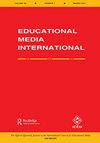Students’ perceptions of mobile learning technology acceptance during Covid-19: WhatsApp in focus
IF 1.4
Q2 EDUCATION & EDUCATIONAL RESEARCH
引用次数: 4
Abstract
ABSTRACT Mobile learning (e.g., WhatsApp) is considered a good platform for educational information and communication, but the educative value of this platform, especially during Covid-19, remains unexplored. This study investigates the factors of mobile learning acceptance (MLA) in Jordan, utilizing the Technology Acceptance Model (TAM) alongside knowledge-sharing, WhatsApp features, and Internet availability as external factor constructs. A hybrid analysis approach was performed on the data to validate the research model via a random sample of 580 university students in Jordan. The study found that PEU and PU were found to be significant predictors of the behavioral intention to accept WhatsApp in education. The findings also revealed that behavioral intention toward MLA was significantly and positively influenced by some of the external factors.Covid-19期间学生对移动学习技术接受度的看法:重点关注WhatsApp
移动学习(如WhatsApp)被认为是一个很好的教育信息和交流平台,但这个平台的教育价值,特别是在Covid-19期间,仍未得到探索。本研究利用技术接受模型(TAM)以及知识共享、WhatsApp功能和互联网可用性作为外部因素结构,调查了约旦移动学习接受度(MLA)的因素。通过对约旦580名大学生的随机抽样,采用混合分析方法对研究模型进行验证。研究发现,PEU和PU被发现是在教育中接受WhatsApp的行为意愿的重要预测因子。研究结果还显示,一些外部因素对MLA行为意向有显著的正向影响。
本文章由计算机程序翻译,如有差异,请以英文原文为准。
求助全文
约1分钟内获得全文
求助全文
来源期刊

Educational Media International
EDUCATION & EDUCATIONAL RESEARCH-
CiteScore
3.20
自引率
0.00%
发文量
10
 求助内容:
求助内容: 应助结果提醒方式:
应助结果提醒方式:


